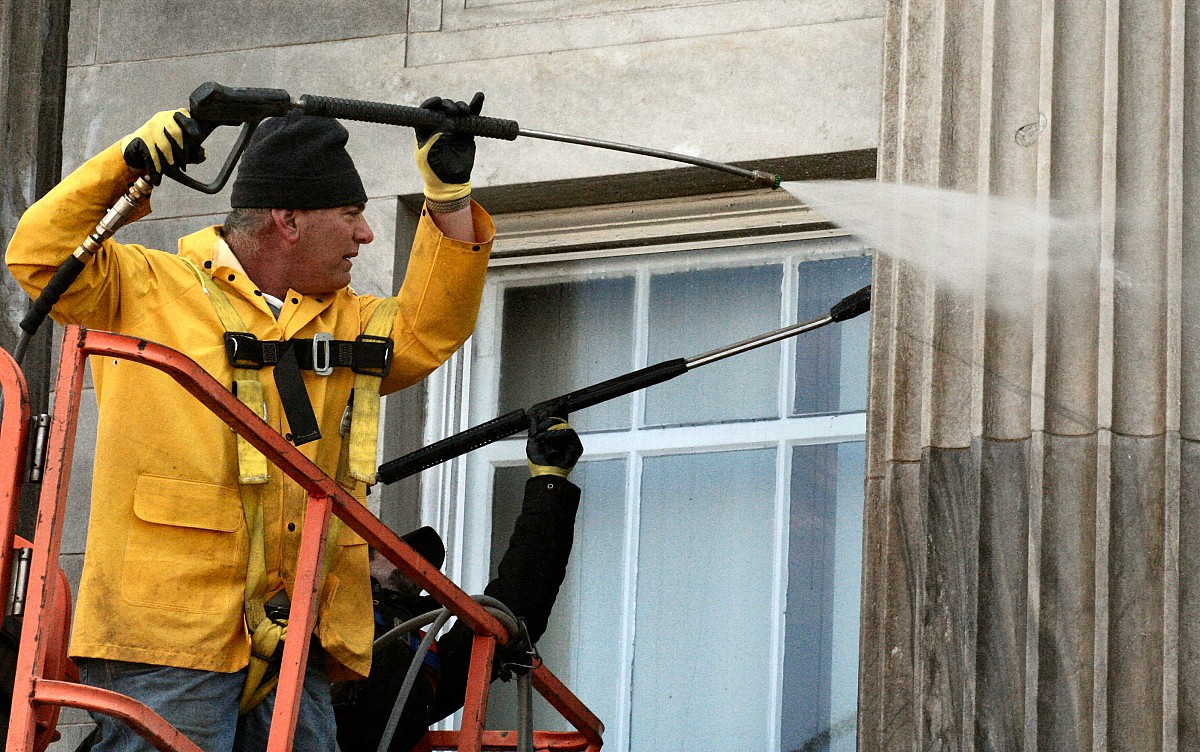Tips for Power Washing
 If you are starting to spend more time outside or preparing to sell your home as the weather warms up , you may begin to notice a layer of dirt on your home or decking. To save time and energy on cleaning, power washing (AKA "pressure washing") might be a good to get rid of the grime. Matt McMillan of Greenfield, MA has worked in contracting and construction for over 25 years and offers up the following helpful tips for successful power washing.
If you are starting to spend more time outside or preparing to sell your home as the weather warms up , you may begin to notice a layer of dirt on your home or decking. To save time and energy on cleaning, power washing (AKA "pressure washing") might be a good to get rid of the grime. Matt McMillan of Greenfield, MA has worked in contracting and construction for over 25 years and offers up the following helpful tips for successful power washing.
Rent, don't buy a power washer
For average homeowners planning to DIY, McMillan suggests renting a power washer instead of buying one. His reasoning goes like this: “You don’t usually use a power washer that many times a year.” Most towns and cites have hardware stores or home centers that rent power washers.
Of course, an easy alternative is to hire a professional handyman who will take care of the power washing project for you.
Safety
McMillan emphasizes the importance of safety when operating a power washer. “It may sound foolish, but wearing safety glasses is important.” He also recommends wearing gloves and never using a power washer on a ladder of any height. McMillan tells of a friend who recently got a hose caught in the ladder he was on while power washing his home. Unfortunately, his friend suffered a bad fall and is now a paraplegic. “Wash everything from the ground. If you can’t do the job from the ground, hire a professional,” cautions McMillan.
What can and can’t you wash with a power washer?
Although most homeowners just want to remove the layer of grime from their home or clean off mold and mildew, McMillan points out, “You can also use a power washer to get off loose paint or clean out cobwebs that are stuck in places you can’t really brush out.”
McMillan adds that a power washer can be used to clean any exterior that is wood, vinyl, concrete, or asphalt, “but no windows or shrubbery.” It’s important to understand how powerful a power washer is, and to be especially careful with wood. “With a fine-point nozzle (on a power washer), you can basically write your name in the wood.”
Using a power washer
McMillan describes the four different sizes of nozzles commonly used for power washers. He recommends that you experiment and “work your way up” to see which size nozzle would be best for the cleaning job you are doing. “For example, if you use too strong a water stream, you can really damage vinyl.”
A number of detergents can be added to the water for an easier cleaning job, though according to McMillan, in most cases a weak solution of bleach works just fine.
Types of power washers
Power washers are powered two different ways. One type is fueled by natural gas, propane, kerosene, etc. The advantage to fuel-powered equipment is more mobility. The downside is that they are noisier and create fumes, so you must take care to have enough ventilation where you are using the power washer.
The second type is an electric power washer. The pluses are less noise and no fumes. However, you need an outlet and you have less mobility.
Hot vs. cold water power washers
Cold water washers are good for simple dirt-cleaning projects on decks, porches, driveways, siding, etc.
Hot water washers are better if you are trying to clean off oils or any greasy/sticky material. Beware: the water in a hot water power washer can heat up to 200 degrees (212 degrees Fahrenheit is the boiling point).
Two essential terms related to power washers
GPM means gallons per minute, or how much water will flow over a period of time. The greater the flow rate, the faster the cleaning time.
PSI means pounds per square inch, or the amount of pressure created per square inch. Greater PSI results in greater efficiency.
Updated August 13, 2018.
Looking for a Pro? Call us (866) 441-6648

Roofing Average Costs
Roofers Experiences

Emergency Fencing Repair After A Tree Fell On My Chain Link Fence

Repairing Our Roof Valley Stopped A Leak From Getting Worse



